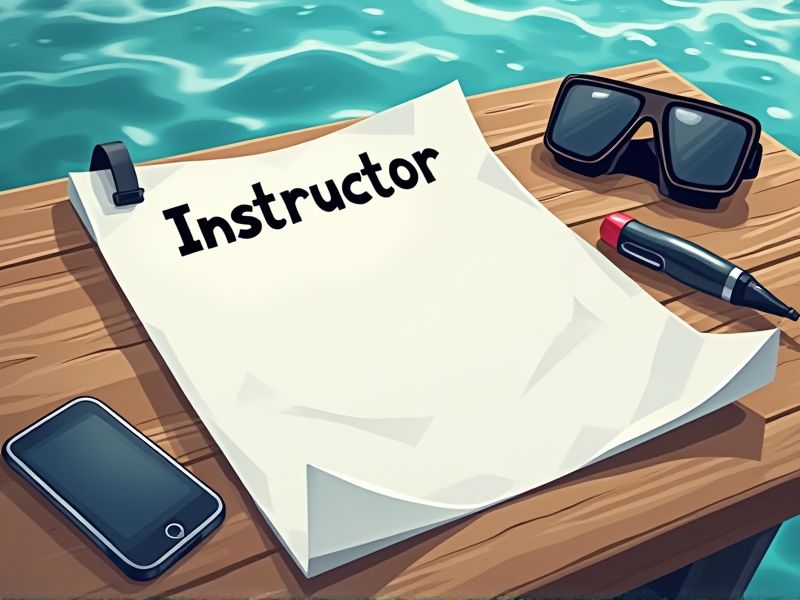
Becoming a scuba diving instructor involves substantial responsibility as instructors lead novice and experienced divers underwater. Certifications ensure that instructors have the necessary skills to handle potential underwater emergencies and teach proper techniques safely. They validate an instructor's understanding of critical safety protocols and dive environment awareness. Some essential certifications you may need as a scuba diving instructor are outlined below.
Open Water Diver Certification
To become a scuba diving instructor, foundational knowledge and skills in diving are crucial, which the Open Water Diver Certification provides. This certification verifies that an individual has completed essential training in safety procedures, dive planning, and equipment handling. Without the certification, the person lacks the standardized assessment of proficiency required to safely teach others. Certification builds credibility and trust, necessary when taking on the responsibility of instructing new divers.
Advanced Open Water Diver Certification
Obtaining an Advanced Open Water Diver Certification equips scuba diving instructors with enhanced skills to handle diverse underwater environments. This certification ensures instructors possess the knowledge to manage deeper dives, typically up to 30 meters, which is often required for advanced training scenarios. It helps instructors demonstrate a higher level of expertise and safety awareness, important for instilling confidence in students. The certification often serves as a prerequisite for further professional training necessary to achieve full instructor status.
Rescue Diver Certification
Scuba diving instructors must possess Rescue Diver Certification because it equips them with the skills to manage emergencies effectively, ensuring the safety of their students. Instructors often encounter varied underwater scenarios, and this certification enhances their problem-solving abilities in stressful situations. It also builds their confidence in identifying and mitigating risks, which is crucial for leading dives. Such training elevates the overall safety standards of dive operations, fostering trust and credibility within the diving community.
Divemaster Certification
A Divemaster Certification develops a deep understanding of dive theory which is crucial for teaching and ensuring students' safety. By gaining leadership skills during the certification, an individual demonstrates the ability to assist in training new divers effectively. This certification familiarizes instructors with managing diverse underwater environments, preparing them to handle various scenarios that might arise during dives. The process reinforces the mastery of essential scuba diving techniques, ensuring the instructor can model best practices confidently.
Assistant Instructor Certification
Obtaining an Assistant Instructor Certification enhances the credibility of aspiring scuba diving instructors, signaling a comprehensive understanding of essential diving techniques and safety protocols. This certification serves as a stepping stone, providing the necessary teaching experience under supervision before leading independent instructional sessions. It also ensures that the instructor possesses up-to-date knowledge of industry standards, promoting safe and informed diving practices. Employers in the diving industry often require this certification as a baseline, fostering a culture of safety and expertise.
Open Water Scuba Instructor Certification
Obtaining an Open Water Scuba Instructor Certification provides credibility, ensuring the instructor has met standardized global training criteria. This certification authorizes individuals to teach and certify new divers, directly affecting their marketability and earning potential. It enhances safety by ensuring instructors are trained to handle varied underwater scenarios and emergencies. Scuba diving schools and organizations often require this certification as it aligns with international safety and training standards.
Instructor Training Course Certification
Obtaining an Instructor Training Course Certification ensures scuba diving instructors have a standardized level of knowledge, which enhances safety and consistency during training sessions. This certification provides instructors with effective teaching methodologies and up-to-date diving techniques, enhancing the learning experience for students. Certified instructors are better equipped to handle emergencies underwater, reducing risks associated with diving activities. Furthermore, certification boosts the credibility of instructors, making them more attractive to dive schools and potential students.
CPR/First Aid/AED Certification
Scuba diving presents inherent risks such as drowning and cardiac emergencies, necessitating CPR/First Aid/AED Certification to manage such life-threatening situations effectively. A certified instructor ensures that they're equipped to provide immediate assistance, potentially reducing fatalities and increasing survival rates. Diving accidents may occur even in calm conditions, making preparedness through proper training crucial. Instructor certification instills confidence in students and fosters a safer diving environment, promoting an enhanced overall diving experience.
Nitrox Diver Certification
Nitrox Diver Certification ensures instructors have the knowledge to safely manage elevated oxygen levels, which helps in averting potential oxygen toxicity during dives. Enhanced safety protocols allow instructors to conduct longer and deeper dives, creating a more effective learning environment for students. Familiarity with nitrox diving equipment and gas mixtures enables instructors to tailor courses that meet specific diving needs and conditions. Certification boosts the credibility and trustworthiness of instructors, thereby attracting more students seeking specialized diving experiences.
Emergency Oxygen Provider Certification
The Emergency Oxygen Provider Certification equips scuba diving instructors with essential knowledge to manage dive-related emergencies effectively. The training focuses on the causes and treatment of diving injuries, enhancing immediate response capabilities. Instructors are better prepared to deliver oxygen therapy, a critical intervention for decompression illness. This certification reinforces safety standards, reducing risk and fostering confidence among divers.
Summary
With additional scuba diving certifications, you can enhance your instructional skills. This leads to more credibility and trust from potential divers. Consequently, you may attract a larger client base and increase earning potential. Diversifying your expertise also opens opportunities for specialized courses and advanced training programs.
